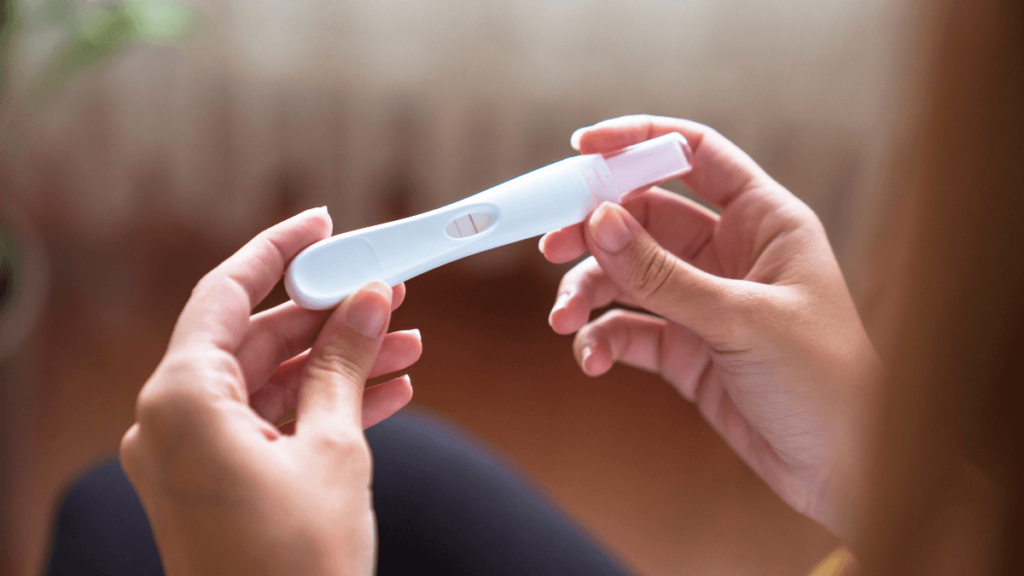Introduction
Pregnancy is an exciting time for any woman, but it can also be a bit daunting. As your bod y changes and you experience new sensations and emotions, it’s important to know the common symptoms of pregnancy so that you can look out for them and understand what’s happening. This article will provide an overview of the typical signs of pregnancy, and discuss how they may affect you in different ways. Some people have symptoms of pregnancy before they miss a period. Take a pregnancy test if you think you may be pregnant. The signs of early pregnancy can vary from person to person and from pregnancy to pregnancy. By being aware of these symptoms, you can be better prepared for the physical and emotional journey ahead.
Overview of pregnancy symptoms
Pregnancy is a period of nine months during which a fetus develops and grows in the uterus of its mother. Light spotting might be one of the first signs of pregnancy. Known as implantation bleeding, it happens when the fertilized egg attaches to the lining of the uterus — about 1 to 2 week and 10 to 14 days after conception. The most common and obvious sign of pregnancy is a missed period, the best way to know you’re pregnant is to take a home pregnancy test. The average length of pregnancy is 40 weeks, counting from the is calculated using the first day of your last period. During this time, the baby will gradually develop all its organs, bones, muscles and other bodily systems that will help it survive after birth. Throughout pregnancy, a woman’s body undergoes many changes to accommodate for the growing baby. Regular medical checkups are recommended throughout pregnancy to ensure that both the mother and baby stay healthy during this period. The amount of blood in your body increases during pregnancy, causing your kidneys to process extra fluid that ends up in your bladder. You may experience pregnancy symptoms within a week of conception. The most common symptoms of early pregnancy include:-
Everyone experiences different symptoms of pregnancy at different times. Here we will explain you 10 early symptoms and signs of pregnancy
1. Common Physical Symptoms
A. Nausea and Vomiting

Nausea and vomiting early pregnancy are quite common and can be experienced after you become pregnant. However, some women feel nausea earlier and some never experience it. While the cause of nausea during pregnancy isn’t clear, pregnancy hormones likely play a role. It is also known as morning sickness, although it can affect pregnant women throughout the day and night. The cause of this condition is unknown, but it is thought to be due to hormonal changes during pregnancy. Nausea and vomiting during pregnancy can range from mild to severe, with some women experiencing no symptoms at all. In most cases, nausea and vomiting will go away after the first trimester of pregnancy, but in some cases, it may persist throughout the entire duration of the pregnancy. If nausea and vomiting become severe or are accompanied by other symptoms such as fever or abdominal pain, then medical attention should be sought right away as this could indicate a more serious condition that needs to be treated promptly.
B. Fatigue and Sleepiness

Fatigue and sleepiness are common during pregnancy. Most pregnant women experience some level of exhaustion, especially in the first and third trimesters. Fatigue is caused by a combination of physical, emotional, and hormonal changes that occur during pregnancy. Many people feel extremely tired in early pregnancy. An increase in progesterone can cause extreme tiredness, while changing blood sugar levels can lead to frequent naps throughout the day. As the baby grows, there is also an increased strain on the body which can lead to fatigue. Other factors such as stress, poor diet, and lack of exercise can also contribute to feeling more tired during pregnancy. To help combat fatigue and sleepiness it is important for pregnant women to get adequate rest, eat nutritious meals, stay hydrated, take regular breaks throughout the day and practice relaxation techniques such as yoga or meditation.
C. Breast Changes

Breast changes during pregnancy can be one of the most noticeable and defining changes that a woman experiences. As the body prepares for childbirth, the breasts become larger, fuller and more sensitive due to increased blood flow. They may also leak colostrum, a thick yellow substance that provides nutrition and protection to the newborn baby. Women may also notice their nipples darkening and their areolas becoming larger as well as veins becoming more visible near the surface of the skin. While these changes can be uncomfortable for some women, they are a normal part of pregnancy and help to prepare for breastfeeding after birth.
D. Weight Gain

Weight gain during pregnancy is a normal occurrence and should be expected by expectant mothers. Though the amount of weight gained during pregnancy can vary greatly, most pregnant women can expect to gain between 25 and 35 pounds. This weight gain is important for the health of both mother and baby, as it helps provide adequate nutrition to both. However, it is important to note that too much weight gain can lead to complications such as pre-eclampsia, gestational diabetes, and other issues. Therefore, it is important for pregnant women to maintain a healthy diet while monitoring their weight throughout the course of their pregnancy. By doing this, they can ensure that they are providing proper nutrition for themselves and their unborn child.
E. Increased need to urinate

The increased need to urinate is a common feeling experienced by many women. This is due to the fact that the uterus puts pressure on the bladder, reducing its capacity and making it harder for the pregnant woman to hold her urine. This frequent urge to pee can be especially troublesome at night, as having to get up several times to go to the bathroom can make it difficult to get a good nights sleep. Additionally, drinking plenty of fluids throughout the day can increase this urge even further, so it’s important for pregnant women to keep their fluid intake in balance with their need for restful sleep. Fortunately, as pregnancy progresses, this condition usually gets better as your body adjusts and you become more used to it.
F. Missed period

Missed a menstrual period is one of the early pregnancy symptoms. It is often the first sign that a woman notices when she suspects she might be pregnant. This symptom can happen anywhere from a few days to a few weeks after conception and usually occurs around the same time each month in non-pregnant women. Other early signs of pregnancy may include tenderness or swelling of breasts, feeling more tired than usual, nausea, frequent urination, increased sense of smell and taste, and light spotting around the time of your expected period. It’s important to note that these symptoms are not unique to pregnancy and can also be caused by other factors such as stress or illness. If you think you may be pregnant, it is best to take a test or visit your doctor for a confirmation.
2. Common Emotional Symptoms
A. Mood Swings

Mood swings during pregnancy are a common occurrence. These can be caused by a variety of factors, such as changes in hormone levels and the physical/emotional strain of carrying a child. During pregnancy, it is normal to experience fluctuating emotions, ranging from elation to sadness or even depression. It is important for pregnant women to be aware of these swings and take steps to manage them. Taking time for self-care, exercising regularly, eating healthy meals, and getting enough rest can all help reduce the intensity of mood swings. Additionally, talking with a mental health professional can aid in developing coping strategies and building resilience against emotional instability.
B. Anxiety and Irritability

During pregnancy, many women experience anxiety and irritability. This is normal for most, as there are so many changes happening in the body and mind. Hormonal changes can cause feelings of stress and worry, while physical changes can lead to feelings of discomfort and tiredness. Anxiety can also be caused by fear of labor or the fear of being a new mother. Irritability may be caused by hormonal fluctuations or lack of sleep due to the baby’s needs or morning sickness. It is important to take time for yourself during this period; talk to your doctor or midwife if you feel overwhelmed or anxious, practice relaxation techniques such as yoga or meditation, get plenty of rest and exercise regularly. In the first few weeks of pregnancy you may have a bleed similar to a very light period, with some spotting or only losing a little blood. Taking good care of yourself during pregnancy will help you feel more relaxed and manage any emotions that arise in relation to your pregnancy journey.
3. Other Symptoms to Watch Out For
A. Back Pain during pregnancy

Pregnancy can be a time of joy and excitement, but it can also bring with it certain discomforts. One of the most common of these is back pain, which is experienced by many women during their pregnancy. Back pain during pregnancy is caused by various factors such as weight gain, postural changes and hormonal shifts. In addition to being uncomfortable, this type of pain can cause difficulty in performing everyday activities. To help manage back pain during pregnancy, women should focus on maintaining proper posture when sitting or standing for long periods of time, as well as engaging in regular exercise to strengthen the muscles that support the spine and abdomen. Additionally, sleeping on one’s side with a pillow between the knees may help to reduce discomfort while sleeping. If symptoms persist or become severe, seeking medical assistance is recommended.
B. Constipation during pregnancy

Constipation during pregnancy is a common but uncomfortable issue. Pregnant women experience constipation due to changes in hormone levels, diet, and physical activity. Symptoms of constipation during pregnancy include infrequent bowel movements and hard stools that are difficult to pass. To help manage constipation, it is important to stay hydrated by drinking plenty of fluids and eating high-fiber foods like fruits and vegetables. Exercise can also be beneficial by helping speed up the digestion process. If these measures do not work, a doctor may recommend laxatives or stool softeners as treatment options. It is important to talk with a doctor before taking any medications during pregnancy as some may be unsafe for the unborn baby.
Conclusion
Pregnancy is a unique time for every woman, and it comes with its own set of changes to the body. Common pregnancy signs and symptoms include nausea and vomiting, increased urination, fatigue, food cravings and aversions, breast changes, abdominal cramping, constipation, and backache. In addition to these physical changes, many pregnant women experience emotional changes as well. All of these symptoms can be normal during the course of a healthy pregnancy. It is important for pregnant women to pay attention to their bodies and seek medical care if any concerning symptoms arise. Although there are a variety of common symptoms associated with pregnancy, each woman’s experience will differ depending on her individual health history. With proper nutrition and prenatal care, most women can expect a safe and healthy pregnancy. If you’re in your childbearing years and a week or more has passed without the start of an expected menstrual cycle, you might be pregnant.
Thank you for taking the time to read this article. We hope that you have gained a better understanding of the topic discussed. It is our goal to provide helpful and informative content on a regular basis. If there is anything else we can do to help, please let us know. We value your opinion and feedback, and look forward to hearing from you soon. Thank you again for reading this article.























